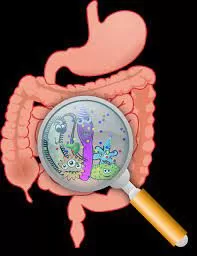Someday, the pills in your medicine cabinet might not just be for you—but also for the trillions of microbes living in your gut. According to Dr. Stanley Hazen, a cardiologist and director of the Center for Microbiome and Human Health at the Cleveland Clinic, emerging therapies could soon target these microbes to help manage chronic diseases, such as cardiovascular disease and diabetes.
Gut Microbiome and Health
Researchers have increasingly found that the gut microbiome, the diverse community of microbes in our digestive system, plays a key role in almost every major human disease. These microbes use the food we eat to produce metabolites—substances that can either protect or harm our health. These metabolites influence conditions ranging from heart disease and obesity to neurological disorders, depression, and even cancer.
Dr. Christopher Damman, a gastroenterologist at the University of Washington Medical Center, notes that microbiome science is becoming a “growing theme” in medicine, as more research uncovers the profound impact of gut microbes on our health.
Targeting Gut Microbial Pathways
One promising approach involves developing treatments that specifically target harmful microbial metabolites. For example, Dr. Hazen’s lab is focusing on a metabolite called trimethylamine N-oxide (TMAO), which has been linked to both cardiovascular and chronic kidney diseases. A new drug that blocks TMAO formation is currently approaching clinical trials, offering hope for safer treatments that work by interacting with gut microbes rather than the human body directly.
“Therapies targeting the gut microbiome could be transformative,” Hazen said, noting that such interventions could even be applied to psychiatric disorders in the next decade.
Microbial Metabolites and Disease
Some of the key metabolites linked to the gut microbiome include:
- Short-chain fatty acids: These are produced when gut bacteria ferment dietary fiber, and they have been shown to reduce inflammation, promote fat burning, and protect against diabetes and obesity. One of these fatty acids, butyrate, is particularly beneficial, strengthening the gut lining and protecting against cancer and metabolic diseases.
- TMAO: Found in higher levels in people at risk of cardiovascular disease, TMAO is formed when gut bacteria metabolize nutrients found in red meat. Hazen’s research has shown that higher TMAO levels are strongly associated with heart problems, even after accounting for traditional risk factors like age and cholesterol levels.
- Tryptophan metabolites: Gut bacteria can convert the amino acid tryptophan into chemicals like serotonin and melatonin, which influence the gut-brain axis and affect mood, appetite, and immune function. However, some tryptophan metabolites can also lead to the production of toxins linked to kidney disease.
- Bile acid byproducts: Gut microbes transform bile acids in ways that can affect inflammation and immune function. Recent studies suggest these transformations could influence conditions like postpartum depression and estrogen levels, with implications for mood, weight, and reproductive health.
The Path Forward
While microbiome research is still evolving, one practical takeaway is clear: a diverse diet is key to promoting a healthy gut microbiome. Dr. Damman emphasizes the importance of incorporating a variety of fruits, vegetables, nuts, seeds, and fermented foods into our diets to increase microbial diversity.
As researchers continue to explore the role of gut microbes in health, microbiome-based therapies are becoming more sophisticated. In the near future, we could see personalized treatments based on the specific makeup of an individual’s microbiome, leading to more effective interventions for a wide range of diseases.
“We are on the cusp of a new era in medicine,” said Hazen. “Just as the discovery of insulin revolutionized diabetes care, understanding how gut microbial metabolites affect our physiology may lead to groundbreaking treatments for many chronic conditions.”
The future of medicine may well revolve around the microbes inside us.











